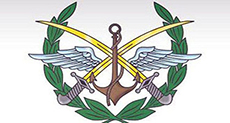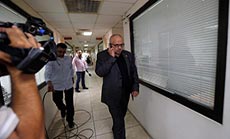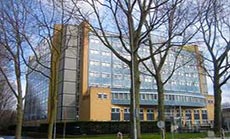Syria Issues Arrest Warrants over STL, Lebanon Plays its Checkmate

Local Editor
The Special Tribunal for Lebanon (STL) has become the major news in the Lebanese people's lives. Not one day passes without a stance on the issue, claiming evidences and facts that should be taken into consideration throughout the STL investigations.
The false witnesses issue has occupied the headlined of papers for quite some time, especially after Lebanese PM Saad Hariri's confession that they misled the path of the STL investigations, adding that prosecuting them will have a huge impact on the STL and all its implications.
Most of Lebanon's political forces agree that the false witnesses have indeed misled the STL investigations into revealing the truth about former PM Rafiq Hariri's assassination.
However, some still insist on triggering domestic incitement, in addition to a "sprinkle of pride" of a historic betrayal with the "Israeli" enemy.
This weekend brought along a stunning development to the STL issue, where Syrian Judiciary issued arrest warrants in absentia for judges, security officers, politicians, and journalists of Lebanon, Arab, and foreign nationalities.
Major General Jamil As-Sayed, one of the four generals who were arrested for being accused of Rafiq Hariri's assassination, announced through his Media Bureau the Syrian Judiciary's issuance of the arrest warrants.
The arrest warrants were issued over false testimonies given to the STL during its investigations.
General Jamil As-Sayed had previously warned of such a step if the false witnesses issue was not followed up by PM Saad Hariri, while after the arrest warrants were issued, As-Sayed urged Syria Judiciary's steps to remain under legal supervision.
General As-Sayed confirmed that the arrest warrants were sent to all border lines and Interpol between countries in order to make sure they are implemented.
In the same context, Major General As-Sayed also referred that this case started almost a year ago, where the General Prosecutor in Damascus sent four intimations to First Investigative Magistrate Judge Ghassan Oueidat, who on his part confessed not responding to any of the intimations.
As a result, the Syrian Prosecutor, when not receiving any cooperation from any sides in any investigations or warrants, has the right to issue arrest warrants in absentia.
The 33 arrest warrants were issued against the followings names: MP Marwan Hamade, former Minister Charles Rizk, former MPs Bassem Al Sabaa and Elias Atallah, Lebanese Prosecutor Saeed Mirza, and Judges Elias Eid and Saqer Saqer.
Also included in the arrest warrant are: General Director of the Lebanese Internal Security Forces (ISF) Ashraf Rifi, Head of the ISF Information Branch Wissam Al Hassan, PM advisor Hani Hamoud, Colonel Husam Tanoukhi, Samir Shahade, Ambassador Johnny Abdou, former Syrian Vice President Abdul Halim Khaddam, retired General Mohammad Farshoukh, Adnan Baba, and Khaled Hamoud.
Journalists sought after in the arrest warrants include Hassan Sabra, Fares Khashan, Nohad Ghaderi from Syria, Abdul Salam Moussa, Ayman Sharouf, Omar Harkous, Ahmad Jarallah from Kuwait, Zahra Badran, Nadim Manla, and Hamid Gharyaqi.
High ranked foreign figures did not get away with this, where warrants against former Head of UN International Independent Investigation Commission Detlev Mehlis and his assistant Gerhard Lehmann were also issued.
Ibrahim Michel Jarjoura, Ahram Shakib Mourad, Mohammad Zuhair Al Siddiq, and Abdul Baset Bani Auda, are the false witnesses who because of them, these arrest warrants were issued.
Apparently this issue caused another reason for tension in Lebanon, or at least represented a political turning point concerning the steps of the STL investigations.
In this context, As-Safir newspaper expected this issue to cause a dramatic effect on the level of internal dialogue over the STL and false witnesses.
An-Nahar sources reveal that PM Saad Hariri showed concern regarding this issue, further adding that it would be scheduled to be discussed in the Ministerial Council regular meeting, and from then political stances will reappear and escalate.
The Special Tribunal for Lebanon (STL) has become the major news in the Lebanese people's lives. Not one day passes without a stance on the issue, claiming evidences and facts that should be taken into consideration throughout the STL investigations.
The false witnesses issue has occupied the headlined of papers for quite some time, especially after Lebanese PM Saad Hariri's confession that they misled the path of the STL investigations, adding that prosecuting them will have a huge impact on the STL and all its implications.
Most of Lebanon's political forces agree that the false witnesses have indeed misled the STL investigations into revealing the truth about former PM Rafiq Hariri's assassination.
However, some still insist on triggering domestic incitement, in addition to a "sprinkle of pride" of a historic betrayal with the "Israeli" enemy.
This weekend brought along a stunning development to the STL issue, where Syrian Judiciary issued arrest warrants in absentia for judges, security officers, politicians, and journalists of Lebanon, Arab, and foreign nationalities.
Major General Jamil As-Sayed, one of the four generals who were arrested for being accused of Rafiq Hariri's assassination, announced through his Media Bureau the Syrian Judiciary's issuance of the arrest warrants.
The arrest warrants were issued over false testimonies given to the STL during its investigations.
General Jamil As-Sayed had previously warned of such a step if the false witnesses issue was not followed up by PM Saad Hariri, while after the arrest warrants were issued, As-Sayed urged Syria Judiciary's steps to remain under legal supervision.
General As-Sayed confirmed that the arrest warrants were sent to all border lines and Interpol between countries in order to make sure they are implemented.
In the same context, Major General As-Sayed also referred that this case started almost a year ago, where the General Prosecutor in Damascus sent four intimations to First Investigative Magistrate Judge Ghassan Oueidat, who on his part confessed not responding to any of the intimations.
As a result, the Syrian Prosecutor, when not receiving any cooperation from any sides in any investigations or warrants, has the right to issue arrest warrants in absentia.
The 33 arrest warrants were issued against the followings names: MP Marwan Hamade, former Minister Charles Rizk, former MPs Bassem Al Sabaa and Elias Atallah, Lebanese Prosecutor Saeed Mirza, and Judges Elias Eid and Saqer Saqer.
Also included in the arrest warrant are: General Director of the Lebanese Internal Security Forces (ISF) Ashraf Rifi, Head of the ISF Information Branch Wissam Al Hassan, PM advisor Hani Hamoud, Colonel Husam Tanoukhi, Samir Shahade, Ambassador Johnny Abdou, former Syrian Vice President Abdul Halim Khaddam, retired General Mohammad Farshoukh, Adnan Baba, and Khaled Hamoud.
Journalists sought after in the arrest warrants include Hassan Sabra, Fares Khashan, Nohad Ghaderi from Syria, Abdul Salam Moussa, Ayman Sharouf, Omar Harkous, Ahmad Jarallah from Kuwait, Zahra Badran, Nadim Manla, and Hamid Gharyaqi.
High ranked foreign figures did not get away with this, where warrants against former Head of UN International Independent Investigation Commission Detlev Mehlis and his assistant Gerhard Lehmann were also issued.
Ibrahim Michel Jarjoura, Ahram Shakib Mourad, Mohammad Zuhair Al Siddiq, and Abdul Baset Bani Auda, are the false witnesses who because of them, these arrest warrants were issued.
Apparently this issue caused another reason for tension in Lebanon, or at least represented a political turning point concerning the steps of the STL investigations.
In this context, As-Safir newspaper expected this issue to cause a dramatic effect on the level of internal dialogue over the STL and false witnesses.
An-Nahar sources reveal that PM Saad Hariri showed concern regarding this issue, further adding that it would be scheduled to be discussed in the Ministerial Council regular meeting, and from then political stances will reappear and escalate.




